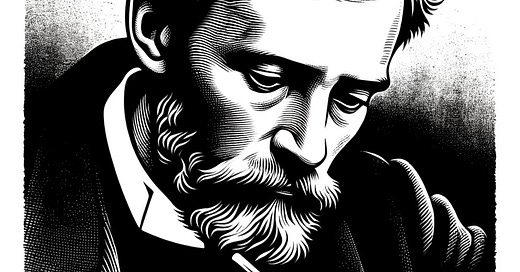Friedrich von Hügel: Navigating Spiritual Dryness
Form no conclusions, make no decisions, change nothing during such crises
Reading von Hügel's1 letter from April 21, 1920, to his niece Gwen, I'm touched by his intimate tone and wisdom. He speaks directly to the heart of spiritual dryness, a phenomenon I've encountered in my own journey, describing it not as a setback but as a deeply valuable phase of growth. He uses vivid images—mountaineers in mist, sailors in storms, and travelers in sandstorms—to illustrate the perseverance needed in our transformational journey. I hope you enjoy it as much as I do! It’s one of my favorites.
21 April 1920
Here at last, my Gwen-child, I come to my scribbling to you!
I have four letters of yours – three of them long. But I think they give me chiefly one big subject-matter for consideration – the stress of dryness and darkness and what to do then.
I know – oh, well, well – what that means. And I do not doubt that with your special temperament, such times must be peculiarly trying. But — mark this well, Child – irreplaceably profitable.
If you but gently persevere through them, you will come out at the other end of the gloom, sooner or later, into ever deeper, tenderer day.
Let me give you three images, all of which have helped me on along "many a flinty furlong." At eighteen I learnt from Father Raymond Hecking, that grandly interior-minded Dominican, that I certainly could, with God's grace, give myself to Him and strive to live my life long with Him and for Him.
But that this would mean winning and practising much desolation – that I would be climbing a mountain where, off and on, I might be enveloped in mist for days on end, unable to see a foot before me.
Had I noticed how mountaineers climb mountains?
How they have a quiet, regular, short step – on the level it looks petty; but then this step they keep up, on and on, as they ascend, whilst the inexperienced townsman hurries along, and soon has to stop, dead beat with the climb. That such an expert mountaineer, when the thick mists come, halts and camps out under some slight cover brought with him, quietly smoking his pipe, and moving on only when the mist has cleared away.
Then in my thirties I utilised another image, learnt in my Jesuit Retreats. How I was taking a long journey on board ship, with great storms pretty sure ahead of me; and how I must now select, and fix in my little cabin, some few but entirely appropriate things – a small trunk fixed up at one end, a chair that would keep its position, tumbler and glass that would do ditto: all this, simple, strong, and selected throughout in view of stormy weather.
So would my spirituality have to be chosen and cultivated especially in view of "dirty" weather.
And lastly, in my forties another image helped me – they all three are in pretty frequent use still! I am traveling on a camel across a huge desert. Windless days occur, and then all is well.
But hurricanes of wind will come, unforeseen, tremendous. What to do then?
It is very simple, but it takes much practice to do well at all.
Dismount from the camel, fall prostrate face downwards on the sand, covering your head with your cloak. And lie thus, an hour, three hours, half a day: the sandstorm will go, and you will arise, and continue your journey as if nothing had happened. The old Uncle has had many, many such sandstorms. How immensely useful they are!
You see, whether it be great cloud-mists on the mountain-side, or huge, mountain-high waves on the ocean, or blinding sandstorms in the desert: there is each time one crucial point — to form no conclusions, to make no decisions to change nothing during such crises, and especially at such times, not to force any particularly religious mood or idea in oneself.
To turn gently to other things, to maintain a vague, general attitude of resignation – to be very meek, with oneself and with others: the crisis goes by, thus, with great fruit.
What is a religion worth which costs you nothing? What is a sense of God worth which would be at your disposal, capable of being comfortably elicited when and where you please?
It is far, far more God who must hold us, than we who must hold Him.
And we get trained in these darknesses into that sense of our impotence without which the very presence of God becomes a snare.2
Freidrich von Hügel, a devout Christian, was an influential figure in the early 20th century. Born into a noble Austrian family, he devoted his life to theological study and promoting Christian values. With his warm personality and open-mindedness, he attracted a wide range of followers and held engaging discussions on faith, spirituality, and social issues. Despite his privileged background, von Hügel championed social justice and advocated for the marginalized. His insightful writings and lectures continue to inspire Christians around the world, making him a beloved figure in Christian theology and philosophy.
Von Hugel, Friedrich. Letters to a Niece. Vatican City: Regent College Publishing, 2001.





I needed the reminder he offers. Thanks for sharing.